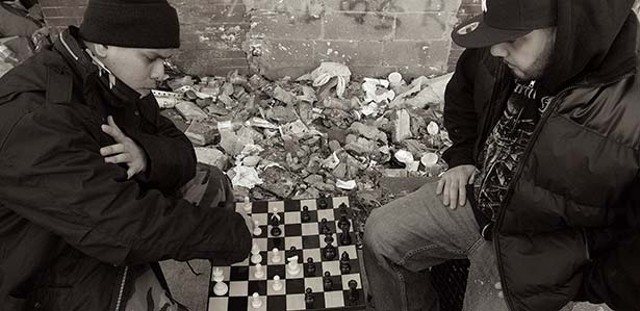Published July 9, 2008 at 5:31 a.m.
Underground hip-hop star Immortal Technique is perhaps the living embodiment of the societal struggles he now writes about. He may also be proof that struggle and steadfast idealism can actually engender positive results.
The arc of Tech's formative years in many ways mirrors the arc of his career. He was born in a military hospital in Peru. His family fled that country's bloody civil war in the early 1980s and sought sanctuary in Harlem, where he was raised and still resides. But his youth in New York City was marked by numerous outbursts of violence and, eventually, jail time.
Similarly, Tech's early music reflected an idealistic, angry and misunderstood artist. Talent and passion were evident in his first two recordings, Revolutionary Vols. 1 & 2 released in 2001 and 2003, respectively. But equally apparent was his youthful inability to fully harness the poetic power at his disposal and wield his fiery commentary as a lyrical pe, rather than a verbal battering ram.
It has been almost five years since those albums dropped and shook the underground hip-hop community and an appalled "Moral Majority" into something resembling wakefulness. During that time, the MC has invested considerable time and energy to help heal the ills he documented so vividly in his early works. Tech has worked with numerous social organizations for a variety of causes, putting his money where his mouth is.
A little older and a little wiser, he now returns with a new mixtape, The 3rd World, and his personal growth shows. Though no less impassioned, Tech has refined his art; he deftly flays social injustice with a cunning blend of humor, insight and intellect. The recording finds the MC fully in control of his abilities and, perhaps more importantly, his message.
Seven Days recently chatted with Immortal Technique by phone in advance of his performance this Friday at the Higher Ground Ballroom.
SEVEN DAYS: What role do you think music can, or should, play in politics?
IMMORTAL TECHNIQUE: Well, I think music and politics, and entertainment and politics have been intertwined since before the Roman Empire. I mean we're talking about over 3000 years of having historical accounts be reproduced by musicians, by artists. By people of all walks of life that have careers based on entertainment.
I'm saying all this because the biggest critics of anything that's revolutionary, or anything that has a message, are people who don't have a product that can match that message. And in order for them to get over that, they constantly remind us: "Well, this is all about entertainment and this all . . . whatever." And I'm saying, "All right, fine."
If we take that example and say that hip-hop is nothing more than "just entertainment," then isn't it just as important to point out that . . . there are all types of entertainment, and entertainment can do different things. Entertainment can inspire. Entertainment can educate. Entertainment can underscore. Entertainment can elaborate on issues.
I mean, most comedians express their politics through their comedy, whether we go back to Lenny Bruce or whether we talk about Chris Rock. So I think that even in that aspect we have to realize that entertainment can achieve so many things. Entertainment can also placate. Entertainment can also pacify. Entertainment can ignore certain issues. So I think it's incredibly important for us to realize the strength and the power that this music has always had. And by "this music," I mean music with a message.
SD: Is that one of the reasons you've resisted signing with major labels?
IT: You're right, brother. But at the same time I thought to myself that if I was going to accept that [major label] power structure, I was going to have to live with the advantages and disadvantages of it. So I thought, if this is the case, what am I really going to end up with at the end of the day, in terms of my own creative processes being affected? And how that is going to be reflected in my music? I mean, if we have to have a board meeting to decide what my album cover is going to look like. Or if I have to turn in music by the boatload and then someone else decides what my single is going to be or how it's gonna be marketed.
Recently, people have been asking me how I decide, if I create songs just for radio. And I say "no" constantly, that I just make music. And then however that works out, based on what we think would be more acceptable to radio, is what we push. But not as a "single" as an introduction to the album. As an introduction to the framework of the conceptual strength of what I'm putting forth. That's why the title track was what we decided to go with for this particular installment.
SD: So does that have anything to do with the length of time between albums?
IT: Yeah. But more than just that, it had a lot to do with the fact that I was involved with so many other projects. And that now I have a distributor that I go through directly, as opposed to going through other people, which caused problems in the past in terms of accounting. So to me it was very, very simple to maneuver in this particular situation, where I'm not constrained by having a deal through anybody else.
But my efficiency has been turned towards touring and the political and social programs I had. So I think that with a lot of stuff . . . I'm not going to say "took up my time," because I don't feel like it was a waste of time. I feel like it was an investment in something important that's going to come to fruition very soon. But I really feel like now, more than ever, it is so important to have a dissenting voice out there, because we were on the verge of having no hope before. And now we're on the verge of having blind hope. Which is just as dangerous.
SD: That's a good point . . .
IT: We all want change. I say this all the time, but the war is not going to end. No one man is going to have the power to end a war where trillions of dollars have been invested. We talk about "change" in this campaign. You know what's going to happen? The war is going to change. The war is not gonna end.
SD: I wish I didn't agree with you . . . but speaking of change, could you talk a little bit about the social programs you're involved with?
IT: I got involved with several different organizations, one of which is G.A.ME, which I helped to co-found: The Graphic Artists Movement (www.kickgame.com). And basically we started it as a prototype for what we think should exist in the music industry, which is a health care system that provides for artists. And it was something that we did to show people and to shame the industry with the example that if some grassroots artists and organizers from the street can accomplish this, why can't a multi-billion-dollar industry provide for the people that are making its music?
I mean, there are people who work in an office at a record label who have health care. But the people involved with actually making the music have none. So I think there's a difference between being a very small independent label like mine, where people have other jobs and health care through them, and then having a gigantic business where you have literally, like, 100, 200 people involved in the process and none of them are covered.
I was also involved with several fundraising projects to support immigrant groups, especially ones trying to provide for children. Specifically, children left behind when their parents were deported. Since they're legal citizens, they were kept in this country. Also fundraising for children's hospitals in Palestine.
Now I'm working with a human-rights organization to create an orphanage in Afghanistan, believe it or not. It's been a very trying time. You can imagine the trouble we go through with all of these organizations. Everyone is so scared. The army called it "terrorism." And I'm sitting here saying, "Look, be serious. Do you really think that we're here funding suicide bombers out of a children's hospital?"
SD: So you really practice what you preach.
IT: The credit doesn't just belong to me. I just came in to help organizations that had already been set up. People from Muslim student unions and people who are street-level organizers and people who are lifelong organizers in general, these people are just as revolutionary, I would say 10 times more revolutionary than most people who talk about that in their music. These people actually live it.
For me it was a very sobering realization to say, "You know what? I talk about all this, and while I participate in it, to look at my brothers and sisters who rhyme about it as well, and yet they're not involved in half of it." . . . It's like comparing a gangsta rapper who rhymes about being a gangster, but isn't really one. And then comparing them to a real gangster from the street that's like, "I have to live like this. I might not be alive tomorrow and this is my life. You don't want to be like me."
So now I'm working with people who live and breathe revolution. This is my life. And I make a living. But at the same time I'm able to help my people as well as support my family. Those two things, altruism and sustenance, can have a symbiotic relationship. You don't have to choose between making a living and prostituting the world, or living in a monastery and taking a vow of silence to protest the injustices of the world.
Info:
Immortal Technique featuring DJ GI Joe, with Diabolic, Poison Pen, Black Sheep, Scratch (of The Roots), DJ A-Dog & Nastee, Friday, July 11, at the Higher Ground Ballroom, 9:30 p.m. $25/30.
More By This Author
Speaking of...
-

Two Local Band Directors March in the Macy's Parade
Nov 22, 2023 -

Before a Burlington Show, the Wood Brothers Get Back to Basics
Oct 26, 2023 -

After a Half-Century of Leading Local Ensembles, Steven and Kathy Light Prepare a Musical Farewell
May 3, 2023 -

Double E 2023 Summer Concert Series Kicks Off With the Wailers
Mar 17, 2023 -

UVM’s New School of the Arts Gathers Many Creative Disciplines Under One Roof
Sep 14, 2022 - More »
Comments
Comments are closed.
From 2014-2020, Seven Days allowed readers to comment on all stories posted on our website. While we've appreciated the suggestions and insights, right now Seven Days is prioritizing our core mission — producing high-quality, responsible local journalism — over moderating online debates between readers.
To criticize, correct or praise our reporting, please send us a letter to the editor or send us a tip. We’ll check it out and report the results.
Online comments may return when we have better tech tools for managing them. Thanks for reading.
















































